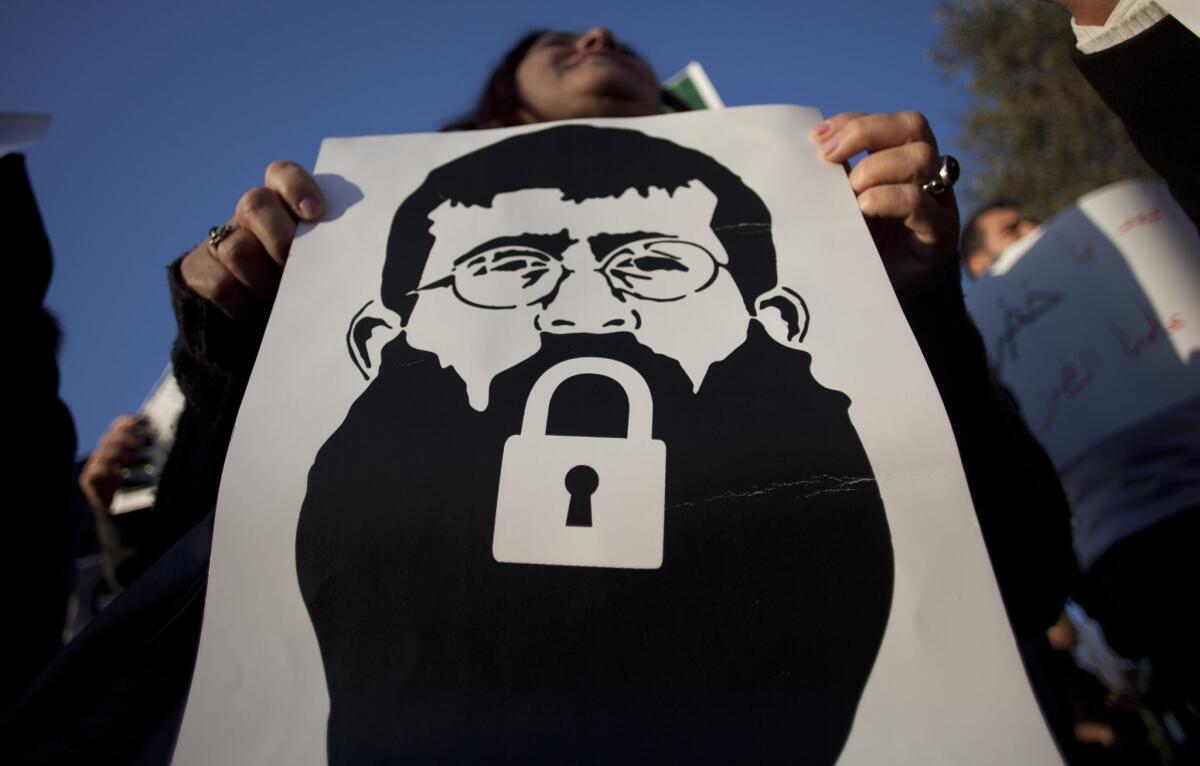Israel passes contentious law allowing force-feeding of inmates

A woman holds a poster of Khader Adnan, a Palestinian inmate who was released this month after a 56-day hunger strike, during a demonstration in Jerusalem in 2012.
Amid fierce objections from doctors and rights activists, Israel’s parliament passed a controversial law Thursday permitting the forced feeding of inmates on hunger strike, most of whom are Palestinians.
The new law authorizes Israel’s prison service to seek a judge’s permission to do the force-feeding if there is a threat to a prisoner’s life. It was passed by a thin margin, with 46 votes in favor and 40 against in the 120-member Knesset.
Opponents of the law say force-feeding is a brutal violation of human rights that amounts to torture.
“This law is a blight on Israel’s book of laws,” said Leonid Edelman, who chairs the Israel Medical Assn.
The organization, which plans to challenge the law in the Supreme Court, argues that the procedure is dangerous and contravenes national and international medical ethics. The risks include tears to the esophagus, collapsed lungs, major infections and pneumonia.
Proponents argue that the state has a responsibility to protect the well-being of individuals in its custody. However, the law is also intended to serve as a deterrent to Palestinian prisoners embarking on extended hunger strikes to draw attention to their detention without trial.
“Hunger strikes by terrorists jailed in Israel have become an instrument for exerting pressure on Israel,” said Minister of Public Security Gilad Erdan, who submitted the bill.
Under the new law, prison medical authorities will be required to provide a deposition showing a clear risk to an inmate’s life or an imminent threat of irreversible harm. The inmate will be entitled to legal representation, and doctors cannot be forced to perform the procedure against their conscience. The judge can permit force-feeding but cannot order it.
Israel is concerned about a backlash if a Palestinian dies in its prisons as a result of a hunger strike.
Erdan said authorities mustn’t be put in a situation where they are forced to release a dangerous prisoner because they lack the legal means to save the person’s life.
“We will not fold in the face of any threat or pressure,” he wrote in a Facebook post after the bill was passed.
Earlier this month, Israel released Khader Adnan after a 56-day hunger strike left him in critical condition. A member of the Palestinian militant group Islamic Jihad, Adnan had been arrested several times and held without charge. He lauded his release as a victory for “the battle of empty stomachs.”
Palestinian advocacy groups say several hundred inmates are being held in administrative detention, which can be extended indefinitely without charge.
Hanan Ashrawi, a senior member of the Palestine Liberation Organization, called the new law a “politically motivated mechanism of terror.”
“Even if intended to benefit, feeding accompanied by threats, coercion, force or use of physical restraints is a form of inhuman and degrading treatment,” she said in a statement.
Sobelman is a special correspondent.
More to Read
Start your day right
Sign up for Essential California for news, features and recommendations from the L.A. Times and beyond in your inbox six days a week.
You may occasionally receive promotional content from the Los Angeles Times.






